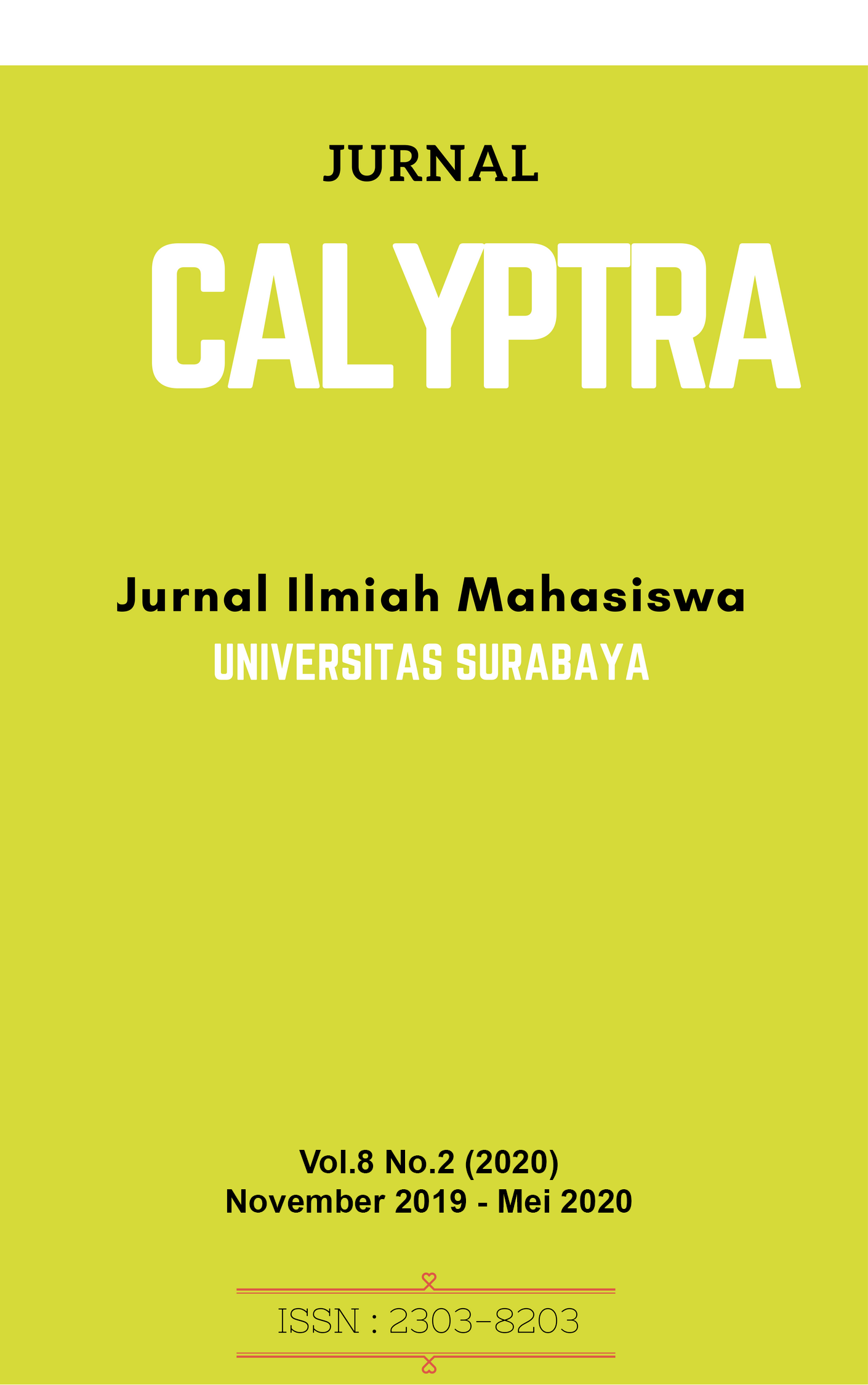Influence of Work Experience, Integrity, Objectivity and Competence Toward Audit Quality at Public Accounting Firm in Surabaya
 Abstract Views:
524 times
Abstract Views:
524 times
 PDF Downloads:
460 times
PDF Downloads:
460 times
Abstract
Abstract--The purpose of this research is to analyze the influence of work experience, integrity, objectivity, and competence toward audit quality at public accounting firm in surabaya. The object of this study is independent auditor that working at public accounting firm in surabaya with the position from junior level to senior level. The primary data that processed is data from questionnaire that has been distributed to 60 auditor as respondent. This study use data from 2017 and the questionnaire is distributed in 2018. The result of this study shows that work experience and integrity has significant influence and positive correlation toward audit quality. On the contrary, objectivity has not significant influence but positive correlation toward audit quality. Then, competence has not significant influence and negative correlation toward audit quality.
Keywords: audit quality, work experience, integrity, objectivity, competence
Downloads
References
Agusti, R., & Pertiwi, N. P. (2013). Pengaruh Kompetensi, Independensi, dan Profesionalisme terhadap Kualitas Audit (Studi Empiris pada Kantor Akuntan Publik Se Sumatra). Jurnal Ekonomi, Vol. 21 (No.3).
Arrens, Alvin A. and Loebbecke, James K. 1997. Auditing. Prentice Hall College.
Bouhawia, Mohammed S., Gugus Rianto, Zaki Baridwan. (2015). “The Effect of Working Experience, Integrity, Competence, and Organizational Commitment on Audit Quality (Survey State Owned Companies In Libya)”. Journal of Economics and Finance (IOSR- JEF), Vol. 6, Issue 4, PP 60 – 67.
Cahyani, K., Purnamawati, I., & Herawati, N. (2015). Pengaruh etika profesi auditor, profesionalisme, motivasi, budaya kerja, dan tingkat pendidikan terhadap kinerja auditor junior. Jurusan Akuntansi Program S1 – e journal S1 Ak Universitas Pendidikan Ganesha, Vol. 3 (No.1).
Christiawan, Y. J. (2002, November). Kompetensi dan Independensi Akuntan Publik: Refleksi Hasil Penelitian Empiris. Jurnal Akuntansi & Keuangan, Vol. 4 (No. 2), 79 – 92.
De Angelo, L.E. 1981. Auditor Independence “Low Balling” and Disclosure Regulation. Journal of Accounting and Economics, Vol. 3: 113-127.
Gary Pflugrath. (2007), “The Impact of Code of Ethics and Experience on Auditor Judgments”, Managerial Auditing Journal, Vol. 22, No. 6, PP 566 – 589.
Ghozali, Imam. 2011. Aplikasi Analisis Multivariate dengan Program IBM SPSS 19.5 Ed (Application of Multivariate Analysis with Program IBM SPSS 19.5 Ed). Semarang: Publishing Agency of Diponegoro University.
IESBA. 2006. Code of Ethics For Professional Accountant
Kuntari, Chariri, Nurdhiana/SIJDEB, Vol 1(2), 2017, 203-218
Kurnia et al. 2014. Pengaruh Kompetensi, Independensi, Tekanan Waktu, dan Etika Auditor terhadap Kualitas Audit (The Effect of Competence, Independence, Pressure Time, and Auditor Ethics on Audit Quality). Accounting Journal of Economic Faculty Trisakti University, Vol. 1 (2): 49-67.
Institut Akuntan Publik Indonesia. (2011). Kode Etik Profesi Akuntan Publik Salemba Empat: Jakarta, Indonesia.
Institut Akuntan Publik Indonesia. (2015). Standar Profesional Akuntan Publik Salemba Empat: Jakarta, Indonesia.
Institute of Chartered Accountants in England & Wales (2005). Agency Theory and the role of audit. Institute of Chartered Accountant in England & Wales.
Jensen, M., & Meckling, W. (1976). Theory of the firm: Managerial behavior, agency cost and ownership structure. Journal of Financial Economics, 3, 305 – 360.
Mulyadi and Puradiredja, K. 2002. Auditing. Jakarta: Salemba Empat. Peursem, K.A. Van. 2005. Conversations with internal auditors. Managerial Auditing Journal, Vol. 20 (5): 489-512.
Pria, A.S., & Tri, W. (2015). Integritas, Objektivitas, Profesionalisme Auditor dan Kualitas Auditor di Kantor Akuntan Publik Jakarta Selatan. Jurnal Riset Akuntansi dan Perpajakan, Vol. 2 (No. 1), 65 – 77.
Primaraharjo, B., & Handoko, J. (2011, Januari). Pengaruh Kode Etik Profesi Akuntan Publik terhadap Kualitas Audit Auditor Independen di Surabaya. Jurnal Akuntansi Kontemporer, Vol. 3 (No.1), 27 – 51.
Rahardja and Handjani. 2014. Pengaruh Etika Auditor, Pengalaman Auditor, Fee Auditor, dan Motivasi Auditor terhadap Kualitas Audit (The Effect of Auditor Ethics, Auditor Experience, Auditor Fee, and Auditor Motivation on Audit Quality. Jurnal Akuntansi, Vol. 3 (2): 2337-3806.
Sujarweni, V. (2014). SPSS Untuk Penelitian Pustaka Baru Press.
Sukriah, I., Akram, & Inapty, B. A. (2009, November 3 – 9). Pengaruh Pengalaman Kerja, Independensi, Objektivitas, Integritas dan Kompetensi Terhadap Kualitas Hasil Pemeriksaan
Sulaiman, W. (2004). Analisis Regresi Menggunakan SPSS. Yogyakarta: ANDI
Tjun, L. T., Marpaung, E., & Setiawan, S. (2012). Pengaruh Kompetensi dan Independensi Auditor Terhadap Kualitas Audit. Jurnal Akuntansi, 4(1), 33–56.
Undang – Undang Republik Indonesia Nomor 5 Tahun 2011 Tentang Akuntan Publik CALYPTRA Vol. 8 (2) Mei 2020
- Articles published in CALYPTRA are licensed under a Creative Commons Attribution-ShareAlike 4.0 International license. You are free to copy, transform, or redistribute articles for any lawful purpose in any medium, provided you give appropriate credit to the original author(s) and the journal, link to the license, indicate if changes were made, and redistribute any derivative work under the same license.
- Copyright on articles is retained by the respective author(s), without restrictions. A non-exclusive license is granted to CALYPTRA to publish the article and identify itself as its original publisher, along with the commercial right to include the article in a hardcopy issue for sale to libraries and individuals.
- By publishing in CALYPTRA, authors grant any third party the right to use their article to the extent provided by the Creative Commons Attribution-ShareAlike 4.0 International license.



